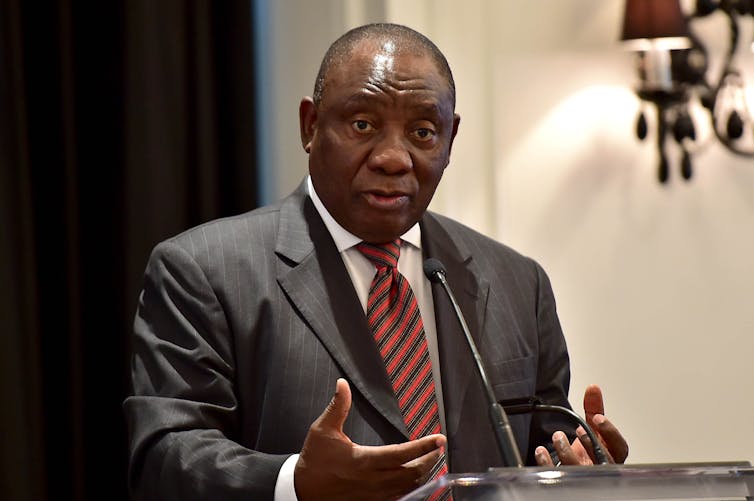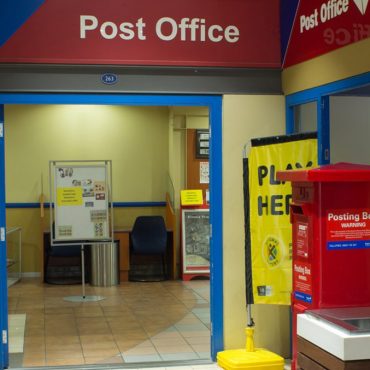-
play_arrow
On The Street On The Air | Kaya 959
Changes to the Constitution may boost, not weaken, South African property rights
By: Steven Friedman, University of Johannesburg

GCIS
The South African government’s plan to change the constitution to mention land expropriation without compensation could, ironically, end up strengthening the property rights on which investment depends.
Pressure to change the Constitution to allow the government to expropriate land without compensation is currently the country’s most contentious issue. Supporters insist that the measure is essential to end racial land ownership patterns which continue to favour whites a quarter century after the end of apartheid. Critics insist that this will threaten property rights and choke off investment.
President Cyril Ramaphosa has now announced that the governing African National Congress will support a change to the constitution’s property clause. This was greeted with predictable anxiety among pro-business commentators. But their fear that the change will weaken property rights seems misplaced. To see why, we must look at what property rights are, what the constitution says and what Ramaphosa and the ANC leadership may have in mind.
Much of the fear seems based on a view of property rights which sounds credible but does not describe reality in market economies. It sees property rights as the right to do whatever you like with what you own. The philosopher CB MacPherson pointed out four decades ago that this is not how property was understood until fairly recently, and not how property rights actually operate.
There is no unlimited right to property anywhere. People who own homes cannot use them to make banned substances or to fire missiles at neighbours. People who own factories cannot use them to enslave labourers or to pump poisons into the air and water. If owners ignore these rules, they will be forced to give up some of their property. Some might even lose the property – think of restaurant owners whose businesses are closed down by health authorities to protect consumers.
None of this is inconsistent with a market economy. On the contrary, these rules are essential to markets. A good analogy is a set of traffic lights. They limit what car and truck owners can do with their property, but they are essential to keeping the property safe.
The property rights of owners are, therefore, strong enough to allow them to invest with confidence when they know what the rules are which decide whether they keep their property.
Certainty is the key – not a blank cheque.
The Constitution
Section 25 of the South African Constitution, which is often held up by friends and foes as a cast-iron guarantee of property rights, is nothing of the sort. It does say the state can expropriate property only if it pays compensation and lists criteria which courts must take into account when deciding compensation. But clause (8) says:
No provision of this section may impede the state from taking legislative and other measures… to redress the results of past racial discrimination
That’s if it complies with Section 36(1) which says the measure must be:
reasonable and justifiable in an open and democratic society based on human dignity, equality and freedom.
So the Section does allow expropriation without compensation – but the wording spelling out when it is allowed is vague. If the government were to test this in court, different judges would inevitably come to different conclusions. This gives owners no certainty and so they don’t know whether their property is safe.
If the constitution is changed to make clear which property may be expropriated without compensation, property rights would be stronger because it would be clear to owners whether their property is safe and what to do to keep it that way.
This is what Ramaphosa and his party say they have in mind. His announcement did not say the constitution should be changed to allow expropriation without compensation – he said that it already does this. The aim, he said, was a clause which “outlines more clearly the conditions under which” land can be expropriated without compensation – in other words, to provide the clarity the current clause lacks.
If he makes good on his promise, the effect will be to strengthen property rights by making it much clearer when the state can take land without compensation. The wording of the clause will be crucial – if it’s too vague and allows the state too much latitude, it will not strengthen property rights. But it’s unlikely that it will seriously threaten these rights because this would place the property of every home-owning ANC voter at risk.
Ramaphosa’s change of view
But, whatever the effect of this particular change, a look at why Ramaphosa made the announcement shows that the right to property in South Africa will be challenged until and unless inequality and economic exclusion are tackled far more vigorously than they are now.
He clearly did not want to change the constitution. After a previous ANC summit on land issues, in May, it insisted that it would not change the constitution. It would, rather, pass an Expropriation Bill and test whether the land redistribution it planned was possible within the current wording.
His announcement this week sounded reluctant: he said that the current constitutional wording does allow expropriation without compensation and then insisted on the need to change it – there was no logical connection between the two.
This strongly suggests that he was forced to change position. Since the change came after a meeting called by the ANC’s National Executive Committee, it was surely pressure from this body which forced a change. This is confirmed by a report claiming that he shifted because the faction within the National Executive Committee which supports former president Jacob Zuma is using the land issue to embarrass him and his faction.
It’s easy to see why Ramaphosa and his allies had no answer to this. Inequality and economic exclusion remain deeply entrenched – the well-off are no longer all white but the poor are still almost all black.
Many black professionals and business people believe the economy is still controlled by the white minority. Given all this, no politician whose support base is overwhelmingly black can deny the need for change without facing the same ridicule as Congress of the People leader Mosiuoa Lekota, whose opposition to land expropriation has politically isolated him .
Realities need to change
South African economic realities mean that rejecting economic change is simply not an option for politicians who seek a large black support base. It will be hard for them to insist on strong safeguards for property when many of their voters do not own any.
![]() The obvious way to change this is to change these realities – to begin to negotiate economic changes which will open the mainstream economy to millions who now languish on its fringes while securing property rights for all.
The obvious way to change this is to change these realities – to begin to negotiate economic changes which will open the mainstream economy to millions who now languish on its fringes while securing property rights for all.
Steven Friedman, Professor of Political Studies, University of Johannesburg
This article was originally published on The Conversation. Read the original article.
Written by: Natasha
Similar posts
-
MORE ARTICLES
-
QUICK LINKS
UpComing Shows

The Best T in the City
With T Bose
He has held it down in the world of mid-morning radio with the best music, riveting topics, brilliant mixes and interesting guests. Every weekday, The Best T proves why he is the BEST by connecting to you like only your bro or favourite uncle could. He lets his listeners dictate the songs they want to hear in the ever-popular Top 10 at 10, and his Three Teaspoons never run out. Catch The Best T in the City Mondays to Fridays from 09h00 to 12h00.
close
Feel Good
With Andy Maqondwana
Feel good about feeling good! That's exactly what The Feel-Good show is about. An escape from the negativity that surrounds us, indulging you in good feels. Pass it on to one and all. Spread the good feeling around Gauteng with Andy Maqondwana.
close
The Hive
With Bonolo "Bee Sting" Molosiwa
Every "Hive" needs a Queen B and Bonolo "Bee Sting" Molosiwa is Kaya 959's honey who brings in the money. With her bubbly personality, infectious laugh, Bee Sting radiates positive energy which is all you need to get your weekend off to the best start. Don't miss the Afrobeat Dancehall Ragga (ADR) Top 10 on The Hive with Bee Sting every Saturday from 18h00 - 21h00.
closeConnect with Kaya 959
DownLoad Our Mobile App
© 2024 Kaya 959 | On The Street On The Air


















